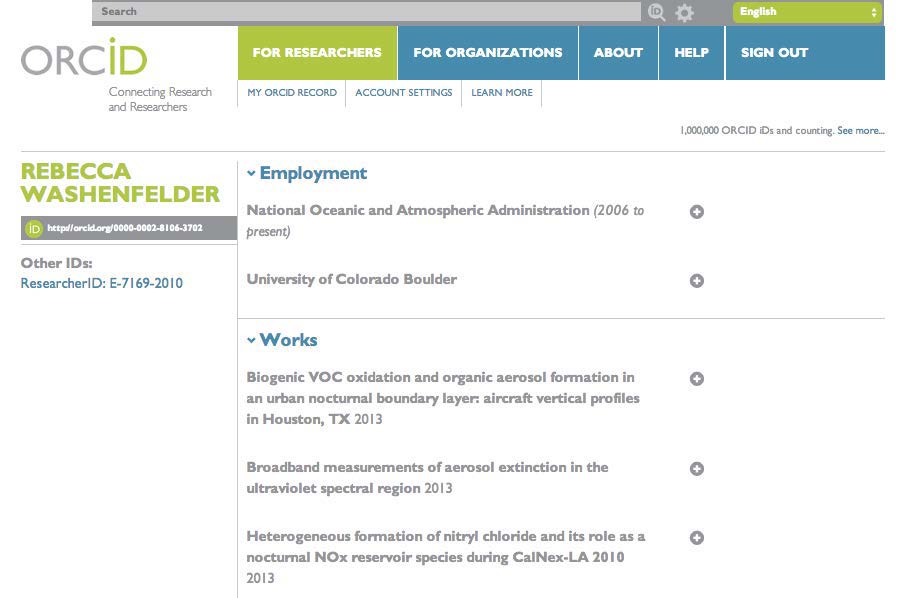
Day 1's tasks may be familiar to you - Google Scholar and ORCID. You are welcome to create both a Google Scholar profile AND claim your ORCID identifier, or just do one of these tasks. If you choose to only create one today, that's fine. We do recommend creating both eventually.
Creating a Google Scholar Profile offers several benefits:
Collect your work in one place for other researchers to find
Track citations of your work automatically
Show up as the first result in searches for your name
Allow users to "Follow" you and receive notifications of your new publications
Jump in and create your Google Scholar Profile.
There are several reasons to sign up for an ORCID identifier, even if you've also created a Google Scholar Profile:
Let’s dig in with Google Scholar.

In addition to providing a academic search platform, Google Scholar allows you to showcase your papers and the citations they’ve received. Google Scholar also calculates a platform-dependent h-index, which many researchers love to track (for better or for worse).

In today’s challenge, we’re going to get you to use Google Scholar, so you can up your scholarly SEO (search engine optimization, aka “googleability”), more easily share your publications with new readers, and discover new citations to your work.
Head to scholar.google.com and click the “My Profile” link at the top of the page to get your account setup started. You can follow these step-by-step instructions if you need a hand (in particular, don't forget Step 3: Make your profile public!):
Dirty data in the form of incorrect publications isn’t the only limitation of Google Scholar you should be aware of. The quality of Google Scholar Citations has also been questioned, because they’re different from what scholars have traditionally considered to be a citation worth counting: a citation in the peer-reviewed literature.
Google Scholar counts citations from pretty much anywhere they can find them. That means their citation count may include citations from online undergraduate papers, conference slides, and similar sources. Because of this, Google scholar citation counts are much higher than those from competitors like Scopus and Web of Science.
That said, the benefits of the platform outweigh the downsides for many.
Congratulations! You've made great progress and we're only on Day 1!
You may now continue on to claim your ORCID identifier or pat yourself on the back for completing the first step in the 5-Day Challenge.
There’s a lot of potential for confusion and mistaken identities in scholarly publishing. You might share a name with other, similarly named researchers! Or you might have changed your name at some point during your career. How are others supposed to know if they’ve found the right you?
Luckily, some smart people have been working to make name disambiguation easy.
ORCID iDs are permanent identifiers for researchers. They protect your unique scholarly identity and help you keep your publication record up-to-date with very little effort. Some funders and publishers are also beginning to require ORCID iDs for new submissions.

ORCID was founded in 2012 as a non-profit organization comprised of publishers, funders, and institutions like Nature Publishing Group, Wellcome Trust, and Cornell University. Over 1 million researchers have ORCID IDs so far, and the number continues to grow.
Setting up your ORCID profile will help you claim your correct, complete publication record. In this challenge, you’re going to claim your ORCID ID so you can automate the collection of your work and related metrics in a future challenge.
Get started by heading to ORCID.org/register and checking out our step-by-step instructions, including:
ORCID is still a relatively basic service. You cannot edit incorrect entries, automatically detect and remove duplicates, or export your profile information in BibTeX, JSON-LD, or other researcher-friendly formats.
ORCID also has gaps in its coverage. It doesn’t find all of your publications, all of the time, and connectable third-party services like Scopus don’t always, either. That means you might have to manually add some works and information to your profile, same as you do for Google Scholar, and all other scholarly profiles.
Congratulations! You have completed Day 1 of the 5-Day Challenge! Tomorrow you'll learn how to track when people cite and discuss your work online.




